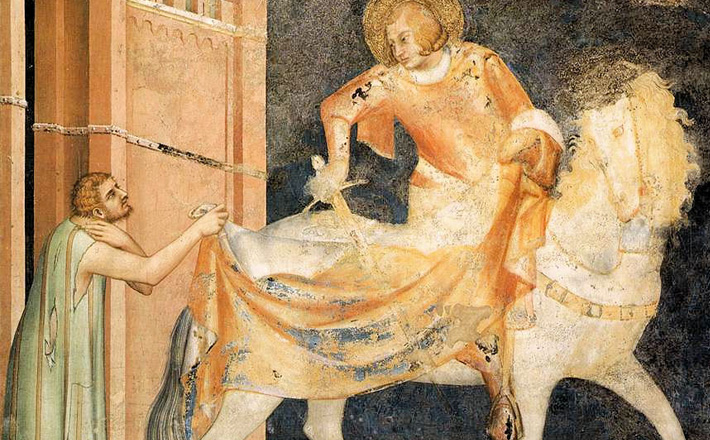Commentary on Psalm 119:33-40
Reading Psalm 119, one can appreciate why Jesus’ contemporaries objected to his ambivalence about the law.
His own protestations aside (Matthew 5:17), he seems to have played rather fast and loose with his own Torah. Sabbath gets nudged aside (Mark 2:27), kashrut laws are put in their place (Mark 7), and he says astonishing things about his own nature that fiercely monotheistic Israel must object to (Luke. 10:22), to give just a sampling.
A devoted reader of Psalm 119 would agree that Jews can argue till hoarse about this or that law and how to honor it. But whether to honor this or that law, or the law as a whole, is not up for debate. Those who pray Psalm 119 love it too much for that.
We might divide this section of 119 into two parts. Verses 33-35 deal with the heart and its instruction. The law is not a matter of cerebral knowledge alone, but of the heart’s delight (verse 35). The second section, verses 36-40, turns to the removal of obstacles in the way of following the law — vanities, unconfirmed promises, disgrace, lack of life.1
Think of the psalm as a lover longing for her beloved. First she enumerates his delights, then she bewails the things that could keep him from her. The section has an importunate tone as it prays — with 9 petitions in just 8 verses. Most are followed with a rationale.2 All positively demand something from God.
There is no limit to observing the law (verse 33). The end of our observation is the end of our life, as the Psalms make clear often — only the dead cannot praise. Its adherents never relax and settle into living like those without love for the law.3 The heart is, of course, the seat of affections in the Bible. The metaphor is so normalized among us we should perhaps point to other bodily regions — to keep the law with our whole guts (to use another biblical metaphor) or our whole throat perhaps. Our more vulgar age has its own imagery for half-heartedness. When Homer Simpson is upbraided by his boss for working “half-ass,” he whines back, “I thought I was using my whole ass.”
Delight is a key biblical category (verse 35). St. Augustine tells a catechist who is struggling with teaching that its key is delight. Those learning will notice what delights you, he says. So, delight in Christ and the scriptures, and those in your charge will slowly catch this benevolent contagion.4
The warning against “selfish gain” is about as biblical as biblical can get (verse 36). It not only makes the Big Ten (Exodus 20:17), it also seems here in the Psalm to compete for space with God. Spurgeon glosses over this verse by saying that covetousness “dethrones God.” It pretends to decide for oneself who gets what, by whatever injurious means.
To covet is to oppose God’s reign of grace, which should invoke gratitude, rather than the envy that seeks to acquire at all costs. It is sobering to think that our entire economic system in the West is premised on defying this unequivocal biblical command.
“Turn my eyes” from vanities, the psalmist prays. Psalms of instruction like the 119th often take up similar themes to the bible’s wisdom literature — in this case the book of Ecclesiastes. “Vanity of vanities, everything is vanity,” the Ecclesiast prays regularly. The psalm is less absolute — there are vanities, and God can help our attention turn to less vain things, like God’s own decrees.
I’ve worked as a movie reviewer and love films and television, but of course sometimes you see things you shouldn’t. And once the eye has seen something it cannot unsee it. A person “should be thankful in this world to have eyelids, and as they can close their eyes, so they should often do it,” one commentator says.5 Spurgeon’s Victorian age often waxes poetic on this theme: another commentator he reports upon says “A careless eye is an index to a graceless heart.”6
The psalm concludes with several notes about fear (verses 38-39). Who doesn’t fear disgrace, shame, opprobrium from others? The one who fears God, that’s who, the psalm says. It takes a greater fear to drive out a lesser. And the empire of fears that rules our lives can only be chased away by a fear even more imperious.
Both “fear” and “delight” describe the same thing — the presence of God, in this psalm embodied in the Torah — its laws, commands, decrees, and ordinances.
We Christians have had our reasons for setting the law aside. Jesus and Paul do it. Those of us who are Gentiles are grafted against our nature into the tree of Israel, and as bitter arguments in the New Testament sorted out, we do not have to keep Israel’s food laws or practice circumcision. Not because those laws are bad — look at Psalm 119, they’re delightful! But because God’s promise to stitch the world back together through Abraham’s family has come to fruition in Christ.
Israel was to be a people set apart to show that God has not abandoned the world. In Christ, God’s repair of the world is here in full. Jews and Gentiles eating together around one table of which Christ is head is a sign to the world that God’s reclamation of the world has begun in earnest. When the church divides, bickers, or spreads calumny rather than good news, we undo our very nature and mission.
Maybe a good place to reclaim it is to rediscover this psalm’s delight in the law. We cherish Israel’s statutes because they show God has not abandoned the world or the children God loves so very much.
Notes:
1 Psalms 3 in Hermeneia by Erich Zenger and Frank Lothar Hossfeld (Minneapolis: Fortress, 2011), 269.
2 C.H. Spurgeon in The Treasury of David: Spurgeon’s Classic Work on the Psalms, ed. David O. Fuller (Grand Rapids: Kregel, 2004), 521.
3 Ibid.
4 William Harmless Augustine and the Catechumenate (Collegeville: Liturgical, 1995), 160.
5 A. Barnes, reported in Spurgeon, 524.
6 A certain William Secker, ibid.


February 19, 2017